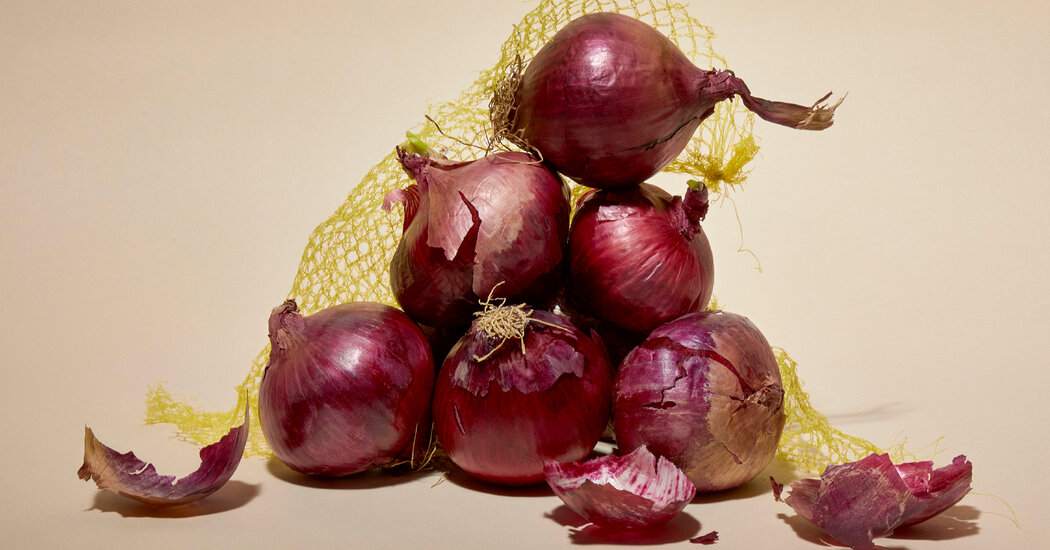
Eight years ago, I spent my first 48 hours in the United States being driven around the New Jersey suburbs by an acquaintance of my father’s. In his eagerness to familiarize me with the superiority of his (and now my) surrogate nation, he took particular care to show me the fundamental institutions that, according to him, made America great: the colossal gates granting entry to New Jersey’s very own Mycenae, the Woodbridge outlet mall; a Dunkin’ doughnut shop; the tube outside a drive-in TD Bank that sucks in checks. Pride shimmered in his eyes, but he grew increasingly irritated when I could not muster much enthusiasm for iced coffee and doughnuts. (I did not have it in me to tell him that Dunkin’ also has outposts in New Delhi, the city I left behind.) It was not until I came face to face with a tower of grenade-size red onions while browsing the organic-produce section at a Wegmans later that day that I felt my detachment toward this new country begin to ease a little.
I am a grotesquely picky eater, a term that’s far more often applied to fractious toddlers than to people my age. I am a vegetarian who eats exactly three vegetables. I can tolerate some dairy, but I still have to repress a retch at the sight of yogurt. The sickly sweet smell of a banana makes me politely excuse myself and flee the room.
When I was a fractious toddler, my mother, who was unemployed, trying to care for a small child and studying for exams, discovered that the one thing I would eat without gagging was something my grandmother also favored: a plain roti, along with finely chopped red onions dusted with salt and spritzed with lemon juice. Later, through years of boarding school in India, the thing that kept me sane was looking forward to lunch on Thursdays, when alongside rajma chawal, we were given razor-thin slices of onions that had been marinated in salt long enough for them to have semi-dissolved. (My love for the onion does not include white and yellow varieties or Cipollinis. To me and my infinite pickiness, they are just pale, sludgewater-filled pretenders that contain neither the astringency nor the bite of their red cousins.)
In my early 20s, I lived in a basement apartment, where my “kitchen” consisted of a mini-fridge, a rickety folding table, a cheap dollar-store knife and a plastic cutting board. It was here that I invented whole meals around red onions in combinations I can only call ungodly and decadent. I dunked slabs of salted red onions in Maggi Hot & Sweet Tomato Chilli Sauce and shoved them between slices of thickly buttered white bread. I ate them wrapped in the rubbery carpet of a Kraft white American cheese slice. I ate them dipped in olive oil and labneh. At Indian restaurants, with my slightly horrified American friends, I would ask for onions, green chiles and salt on the side and proceed to chomp on them in eyes-closed pleasure throughout the meal.
When cooked, the onion is a sturdy and gracious supporting character that quietly allows the dish to take center stage. But when consumed raw, sprinkled with a little salt and pepper, a bitter alchemy transmutes its heat into an experience so intense that a single bite contains an entire sensory universe. I can conceive of no greater pleasure than biting into a slice of a raw red onion and being suspended for a few seconds in a cocoon of sensation: the sound of the primordial crunch as my teeth sink into it, even as it shoots rockets of discomfort up my nostrils.
I am wholly aware that confessing my love for raw onions is almost akin to revealing myself as a believer in some fringe YouTube conspiracy theory. “But what about, you know. … ?” is the baffled reaction I often receive when I share this information, because of the obvious associations that onions have with bad breath and other violations of civilized society. The way we eat now is tinged with a certain sterility that we demand from our food — stripped of all its origins, the odors, the textures. But whether you’re peeling it, dicing it, wiping off the sticky tears caused by it or scrubbing your fingers clean of its stubborn fragrance, the onion reminds you at every step that it is alive.
My new apartment has a kitchen, and I’ve learned to do things with food that go beyond merely knowing how to hack onions. I earn enough to occasionally order food from a restaurant without worrying whether it’ll leave me without money for a MetroCard. But in the winter months of 2020, when time slowed to a thick, tarlike sludge, it was my deranged way of eating onions that kept me sane and fed, especially on the days when a hulking despondency attacked my every attempt to live normally.
There were times when I could only drag myself in three-day-old clothes to stand over the counter, knife in hand, inelegantly dice an onion, dip it in salt and devour it with white bread — a combination that still produced a burst of freshness and sensation so acute that it made my teeth ache. On days like that, just glinting through the tears wrung out by these pungent talismans, once believed to guard us from otherworldly evils, gave me a jolt of vitality. Tasting the stinging sharpness felt as if I were borrowing a bit of their aliveness, at a moment when mine couldn’t be found.
Iva Dixit is an associate editor at The New York Times Magazine.



